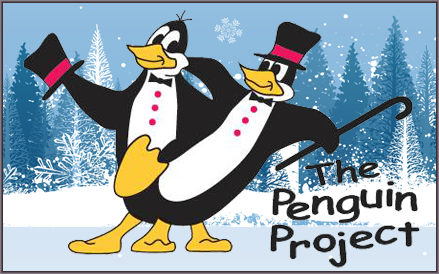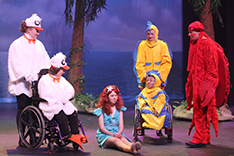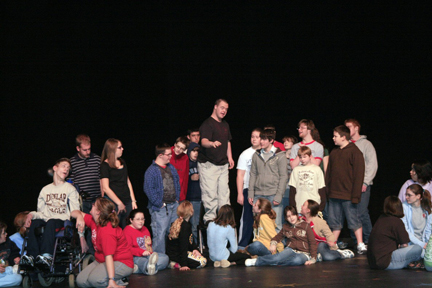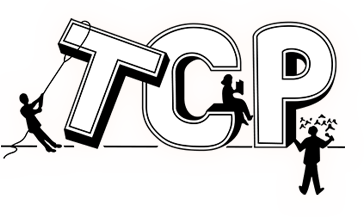Penguin Project

A Great Honor
Tahlequah Community Playhouse has been accepted as a replication site for The Penguin Project®. What is this program? I’m glad you asked!
Introduction
The Penguin Project® was conceived by Dr. Andrew Morgan to give children with special needs an opportunity to participate in the performing arts. “Dr. Andy” is a developmental pediatrician and the former Head of the Division of Child Development at the University of Illinois in Peoria. He has also directed and performed in many community theater productions in the area. He created The Penguin Project® recognizing that theater not only provides children with a valuable recreational experience and an opportunity to display their creative talents, but also enhances social interaction, communication skills, assertiveness, and self-esteem.

The Penguin Project® strives to demonstrate that individuals with special needs are fully capable of participating in community activities with the same dedication and enthusiasm as others, if given opportunity and support. The origin of the name “Penguin Project” comes from the unique characteristics of penguins. They are extremely playful and curious, and work well together. More importantly, they have a “disability” that distinguishes them from other birds – they can’t fly!! Instead, penguins waddle and toboggan on their bellies over the snow, and are excellent swimmers in the water. So like our young artists, they have adapted to the challenges of their environment, and have not allowed their unique difference to interfere with their lives.
Participants
Young Artists With Special Needs:
The Penguin Project® is open to any individual age 10 to 21 with a developmental disability. This includes children with cognitive, learning, motor, hearing, and visual impairments, genetic disorders, and neurological disorders. There are no restrictions based on the level of cognitive ability, restriction of mobility, or lack of communication skills. Because of concerns for safety, however, we are unable to accept anyone whose behavior might endanger himself/ herself or others.
Peer Mentors:

The Penguin Project® utilizes a “peer mentor” system, linking each young artist with an age level peer who does not have a disability. Mentors must be at least 10 years old and can continue up to age 21. The peer-mentors work side-by-side with their partners, assisting them throughout the entire rehearsal process and on stage. The mentors are responsible for knowing all of the lines, songs, and blocking of their partners. They are on-stage during the production, costumed to match or compliment their partners. They participate in the group production numbers, but are trained to remain “in the background” and provide direct assistance to their partner only as needed.
Families and Adult Volunteers:
The Penguin Parents are the “backbone” of the program. We depend on them to assist their children in learning lines, songs, and dances outside of the rehearsals, since rehearsal times are limited and need to
focus on interactive processes rather than memorization. Family members and other adult volunteers also help build sets, sew costumes, and find props. They coordinate the backstage area during the run of the show, and are often called upon to assist the staff at rehearsals.
Goals of the Project
- To provide an opportunity for children with special needs to develop creative skills related to the theater arts
- To provide an opportunity for children with special needs to participate in a community theater experience
- To facilitate interaction between children with special needs and their age-level peers through joint participation in a community theater experience
- To facilitate an appreciation of the challenges faced by children with special needs and their families
- To identify the impact of a community theater experience on the communication skills, socialization, and self confidence/self esteem of children with special needs
- To facilitate interaction among medical, developmental, educational, and theater professionals through participation in a common community project
- To provide a forum for support and interaction for families of children with special needs
Plays and Directors
- The Penguin Project Committee will include representatives from the following groups: TCP Executive Board, past and/or current Penguin Project team members, Penguin Project parents, Penguin Project artists/mentors, other interested parties.
- The Penguin Project Committee will select a play for the upcoming production. Play suggestions may come from outside of the committee.
- The Penguin Project Committee will select a director for the upcoming production. If the director is not already a member of the Penguin Project Committee, while serving as director they will expected to attend any committee meetings during the planning and production time frame.
- The Penguin Project Committee will assist the director in location resources and/or identifying potential team members for the upcoming production.
- The Penguin Project Committee will assist with fundraising and publicly and needed.
- The Penguin Project Committee will assist the director and/or production coordinator in filing final reports and/or payment requests for the Penguin Project Foundation.
Additional information can be found at www.penguinproject.org.
Get Involved
For information on how you can be involved in TCP’s Penguin Project, contact:
Peggy Kaney: (918) 931-2446 | Bryn Smith: (918) 457-0235
“Tahlequah Community Playhouse’s
Penguin Project”
and
“Tahlequah Community Playhouse”
